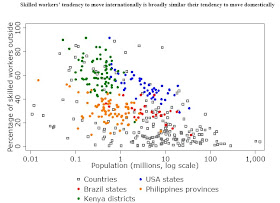There is this popular impression that brain drain (migration outflows) signifies as a social cost.
A UN study by Michael A Clemens refutes this notion and suggests that brain drain dynamics function similar to domestic urbanization trends and is a net benefit to society.
``All of these “best practice” policy levers have two things in common:
First, they expand the choices available to skilled workers. For example, rural service incentives reduce the tradeoff between serving underserved populations and personal hardship.
``Second, they are more effective than shaping professionals’ migration choices per se because they address the underlying causes of those choices. For example, removing barriers to professional employment at home can change decisions freely made by potential emigrants. The common trait of “worst practice” policies is that they seek to limit skill flow itself, which is to say, to limit choices by skilled workers.
``It is time to bury the unpleasant and judgmental term “brain drain”."
Read the rest of the study here
In short, the pejorative term "Brain drain" serves to allocate labor where it is needed most. And it gives people the freedom to work for personal or career advancement. Moreover, brain drain could also be seen as an escape valve from unfree economies.

No comments:
Post a Comment